This article was written by Steve Hou, PhD, co-head of equity research at Bloomberg Indices.
Today’s global economic landscape is characterized by geopolitical turmoil, particularly the Russian invasion of Ukraine in 2022 and escalating tensions between the United States and China. This complex geopolitical environment requires a thorough assessment of the new risks associated with international investments, particularly in emerging markets. Investors are becoming increasingly cautious given the uncertainties arising from a politically unstable environment, particularly in countries with non-democratic regimes.
Discover our index families.
Despite these challenges, the potential benefits of investing in emerging market stocks make them an attractive option for investors willing to accept the geopolitical risks. Since emerging market stocks have underperformed US stocks for over a decade, it is easy to forget that emerging market stocks significantly outperformed US stocks in the 2000s [Figure 1]. Today, EM stocks offer the most attractive prospects in two decades, with the EM index’s P/E ratio relative to the US large cap index (B500 index) hitting a low in 2022 not seen since 2004. Additionally, global restructuring is underway to restructure supply chains through near-shoring or friend-shoring, creating significant economic opportunities for companies based in emerging markets that are viewed as more reliable partners by the United States and other advanced Western economies.
Taking risks and opportunities into account, Bloomberg has launched a novel index for emerging markets: the Bloomberg Emerging Market Democracies Index (BFREE Index). The BFREE Index uses a comprehensive dataset from Freedom House and provides investors with exposure to stocks from countries that are considered electoral democracies. Using the BFREE index as an example, this article describes the risk and return of investing in democracies as an alternative to traditional EM indices (details on the construction of the BFREE index can be found here).
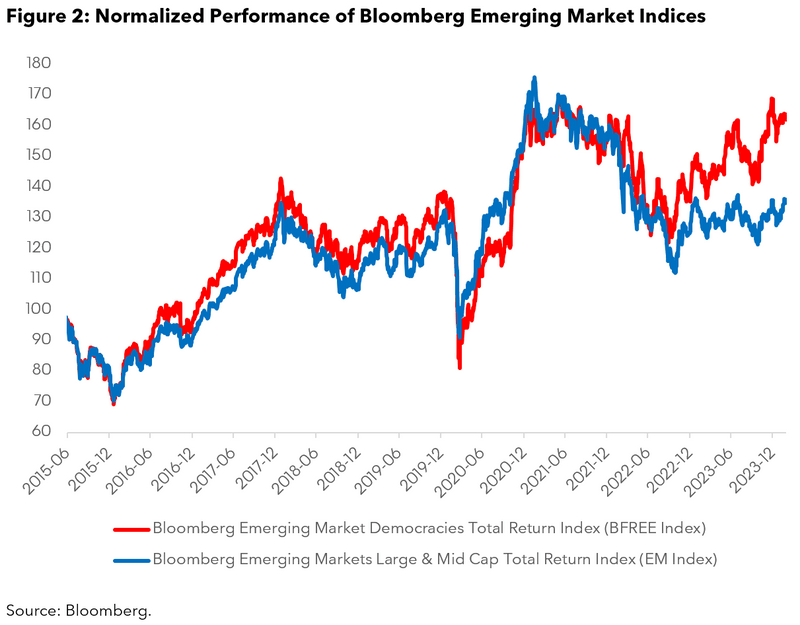
The BFREE index has outperformed the vanilla EM index in recent years
Since April 20, 2015, the BFREE Index has consistently outperformed the traditional Bloomberg EM Index in cumulative total return by up to 40%. This outperformance has been particularly pronounced in the last two years. Since February 24, 2022, the start of the Russian invasion of Ukraine, the BFREE index has outperformed the EM index by 16%. While the EM index experienced a significant decline in 2022 from which it has not yet fully recovered, the BFREE index experienced a milder downturn and showed a robust recovery.
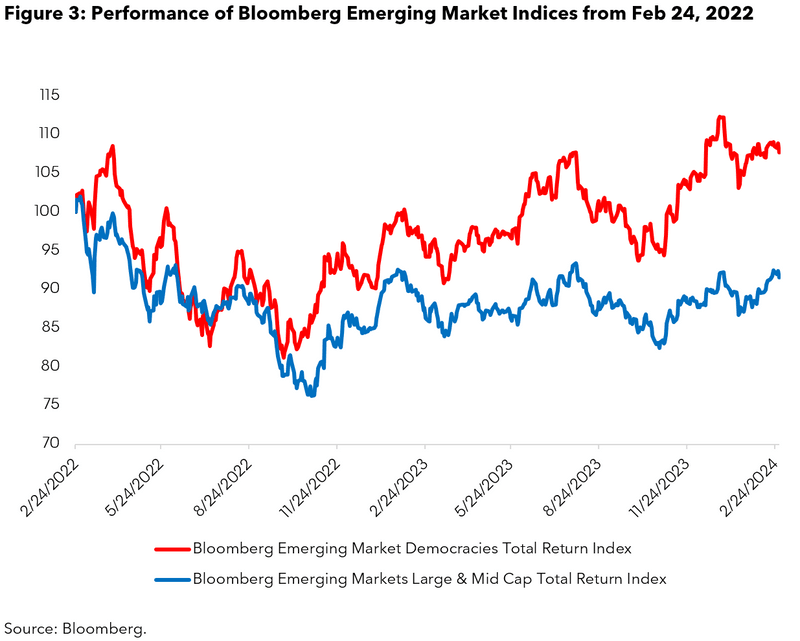
Explain outperformance
What factors contribute to the outperformance of the BFREE index? Are there fundamental and lasting reasons for this superiority? Since there are no explicit style or industry factor filters in BFREE index construction (apart from a market capitalization filter), all active factor exposures are arguably the result of exposure to democracy factor. What risks and benefits are associated with the democracy factor? To answer these questions, we use Bloomberg’s MAC 3 equity risk model to decompose the excess returns generated by the BFREE index.
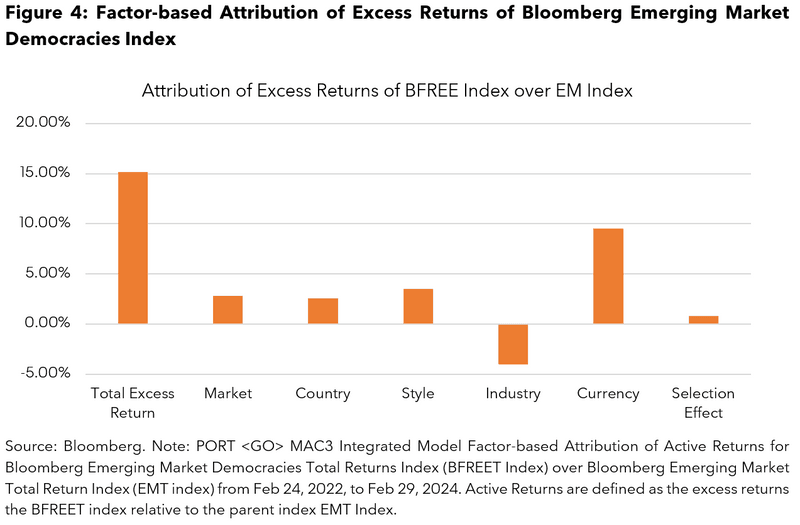
Figure 4 breaks down the cumulative excess returns of the BFREE index over the EM index into the equity factor components. From February 24, 2022 to February 28, 2024, approximately two-thirds of the BFREE Index’s excess returns can be attributed to favorable currency exposures. These include underweighting (or avoiding) China and overweighting positions in Mexico and Brazil. It is noteworthy that Mexico and Brazil are electoral democracies, while China is known not to be.
As shown in Figure 5, Mexico has gained economic benefits from US-China decoupling. The country has increasingly become an attractive manufacturing location, particularly under the USMCA agreement and in light of US tariffs on Chinese exports. Mexico overtook China to become the U.S.’s leading trading partner in manufacturing in 2022, according to U.S. Census data.
Looking forward, as shown in Table 6, the BFREE index is overweight India, South Korea and Taiwan. As a result, active exposures to democracies are strategically positioned to benefit from new drivers of global growth, including the ongoing shift in manufacturing supply chains away from China and increasing demand for high-performance computing driven by advances in artificial intelligence.
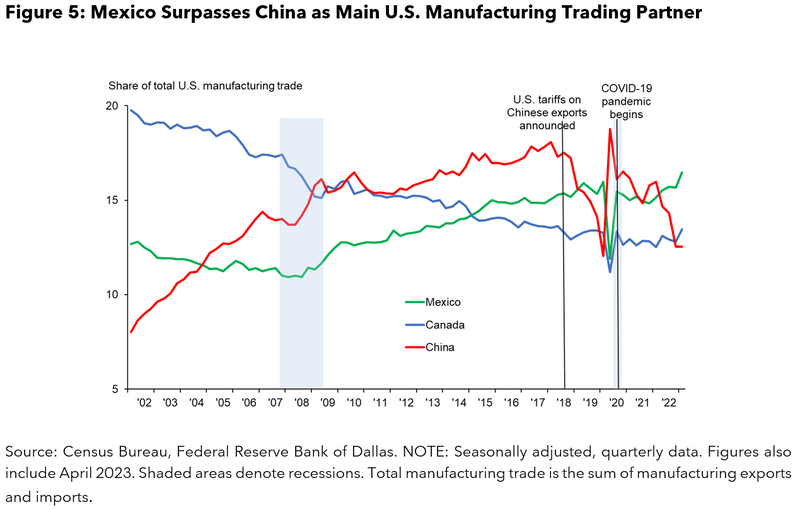
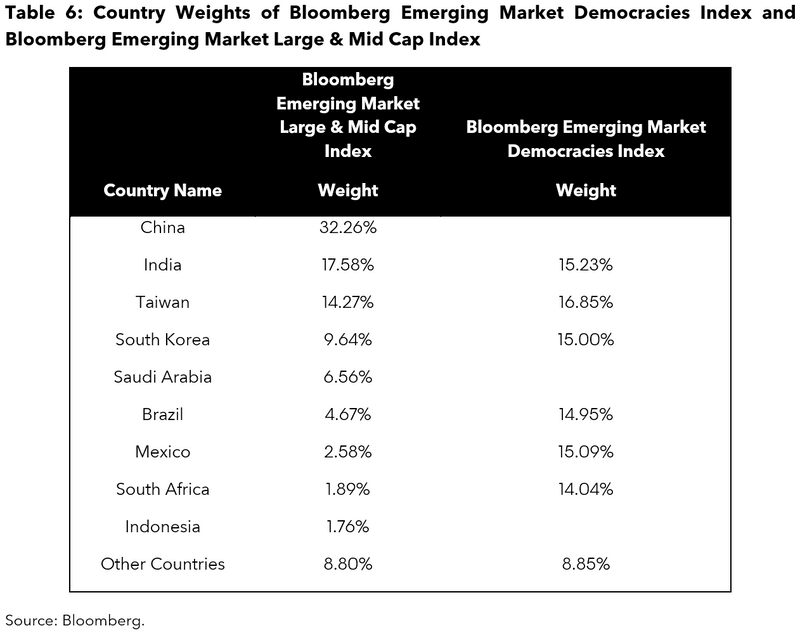
The components of the BFREE index have a more favorable factor exposure
Beyond country exposure, the Bloomberg Emerging Markets Democracies Index also has interesting style factor exposures, as shown in Figure 7. In general, the BFREE index has higher liquidity, slightly higher market beta and lower financial leverage, lower earnings variability, lower residual volatility, etc. at a more favorable valuation. Overall, the BFREE index represents an upward shift in quality. Since 2021, new trends have emerged, which the BFREE index has also become more profitable than the broader EM index, has shown stronger share price momentum, while its active market beta has also declined.
In other words, the BFREE Index’s recent outperformance is due less to greater market beta than to a combination of favorable factors: cheaper valuation, higher dividend yield, stronger momentum and stronger quality (including higher profitability and lower debt and earnings variability). ). This combination of style factors has historically been associated with significant positive risk premiums.
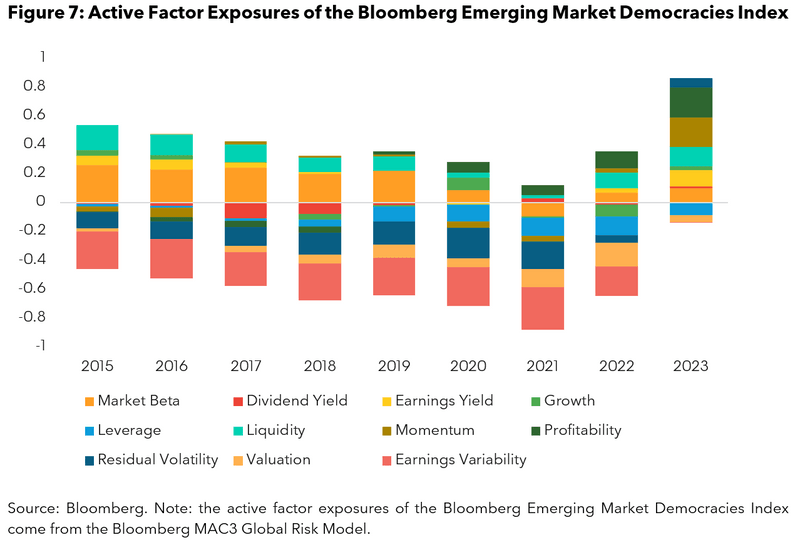
Diploma
Investing in emerging market democracies can offer investors an alternative approach to capitalizing on emerging market opportunities, with macroeconomic and quantitative factors suggesting potential outperformance compared to traditional emerging market stocks. Recent geopolitical changes favor democratic emerging economies and position them to benefit from expected structural economic changes. Stocks in democracies exhibit favorable style factors that are typically accompanied by positive risk premiums, making them an attractive choice for investors looking to diversify their returns.
First Trust has launched the First Trust Emerging Markets Democracies ETF based on the BFREE Index under the ticker In DM.
The data and other information contained in this publication is for illustrative purposes only, is available “as is,” is non-binding and constitutes factual information rather than advice regarding financial products. BLOOMBERG and BLOOMBERG INDICES (the “Indices”) are trademarks or service marks of Bloomberg Finance LP (“BFLP”). BFLP and its affiliates, including BISL, the administrator of the indices or their licensors, own all proprietary rights in the indices. Bloomberg LP (“BLP”) or one of its subsidiaries provides global marketing and operational support and services to BFLP, BISL and their subsidiaries.
